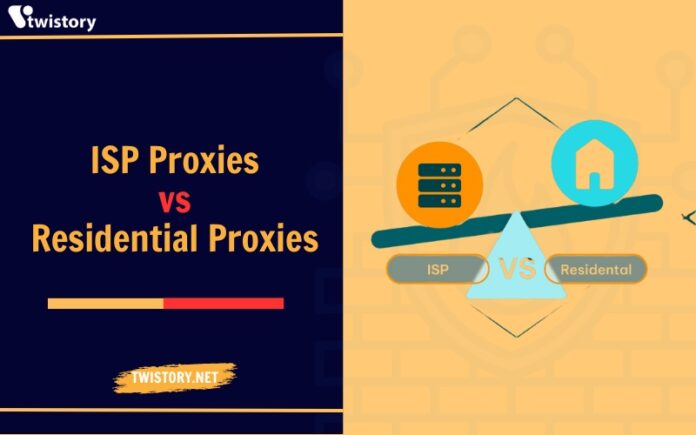Whether you are new to proxies or a seasoned user, you may be curious about the difference between the two types of proxies, ISP vs residential proxies. Both types serve the purpose of hiding your IP address, but what makes them different? And when should you choose one over the other? Let’s explore these questions and provide comprehensive answers.
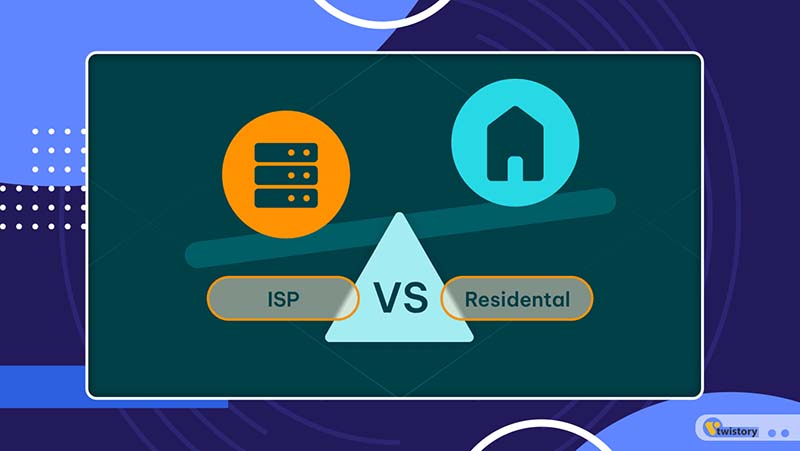
1. ISP Proxies: Definition and Operation
ISP Proxies, often referred to as Static Residential Proxies, are sourced directly from Internet Service Providers (ISPs). These proxies stand out because, while they are housed in data centers, they’re recognized by websites as genuine user IPs. This is a key advantage – it’s like having a digital disguise that’s almost foolproof. The routing of requests through a data center means a more direct, less convoluted path for your data. This streamlined journey results in faster data collection, often outpacing the industry norm.
However, ISP proxies do have their limitations. They’re not built for handling a large number of requests simultaneously, and they’re best suited for websites with simpler blocking systems or less complex architectures.
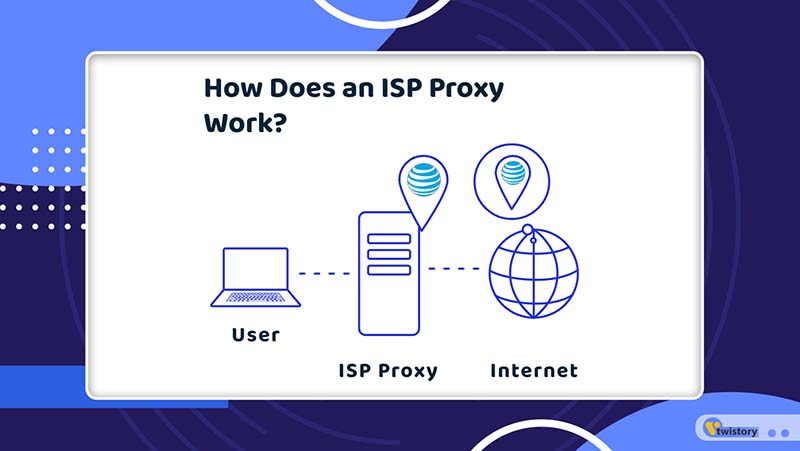
Just like any proxy server, ISP proxies work by funneling your internet requests through a different IP address. This effectively masks your own IP and location, allowing you to browse anonymously or use automation software without revealing your true digital identity.
2. Residential Proxies: Definition and Operation
Residential proxies are a unique breed of proxy servers, known for their use of rotating IP addresses sourced from actual residential internet connections provided by ISPs. What makes them stand out is that these IPs are linked to real devices – be it a desktop computer, laptop, tablet, or a smartphone connected to Wi-Fi. This rotation of IP addresses with each request, or the option for longer sessions, significantly bolsters your defense against being blocked or banned, as it continually shifts your digital footprint.
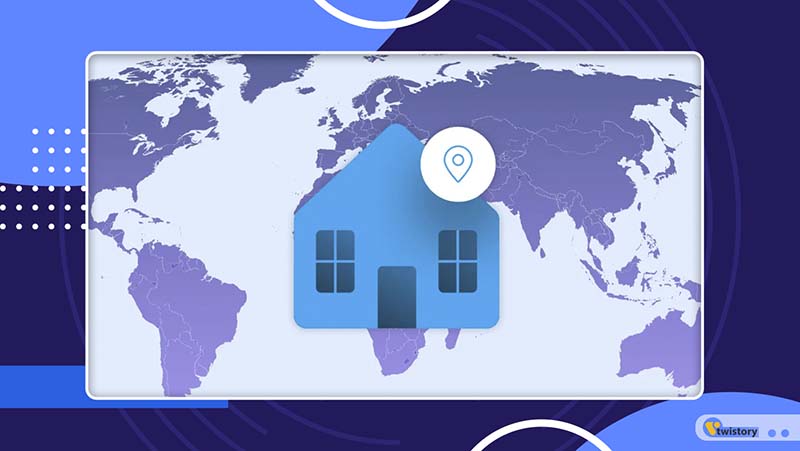
These proxies work by passing your internet requests through this network of truly local user devices. This method not only lends an air of authenticity to your online activities, making it incredibly challenging for websites to detect and block you, but it also has a flip side. The intricate routing process can slow down the speed at which you retrieve data.
3. ISP vs Residential Proxies: Commonalities and Differences
ISP vs Residential proxies are two flavors of proxies that serve the same basic purpose: masking your original IP address to provide anonymity and circumvent geo-restrictions or IP bans. While they share some commonalities, they also have distinct features:
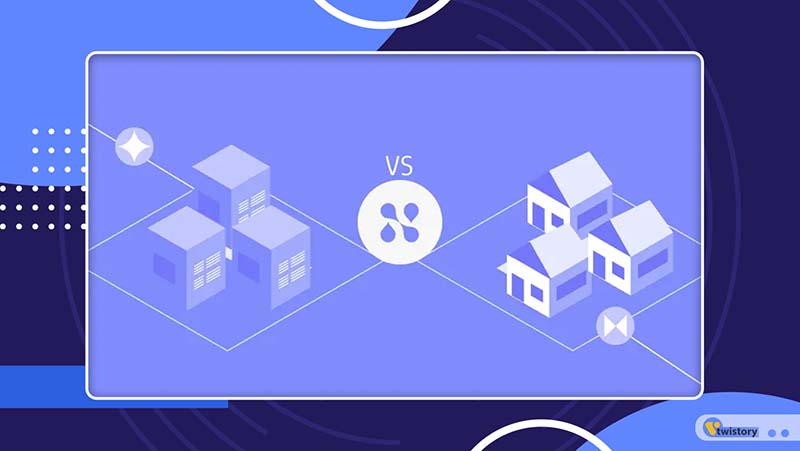
3.1 Commonalities
- Anonymity: Both types offer anonymity by swapping your actual IP address with a different one.
- Access to Geo-Restricted Content: They enable users to access content or websites blocked in their real location.
- Bypassing IP Bans: Handy for sidestepping bans or blacklists linked to specific IP addresses.
- IP Pool: Each utilizes a pool of IP addresses to assign to users.
3.2 Differences
IP Address Origin:
- Residential Proxies: Utilize IP addresses from real residential locations, making them seem like regular internet users to most sites.
- ISP Proxies: Sourced from Internet Service Providers, these can be data center IPs or designated proxy IPs, not necessarily tied to a residential address.
Trustworthiness:
- Residential Proxies: Viewed as more credible because they mirror a real user’s internet usage.
- ISP Proxies: Potentially less trusted, as they might be recognized as non-residential traffic by vigilant websites.
Speed:
- Residential Proxies: Their speed can fluctuate due to the nature of residential internet speeds.
- ISP Proxies: Typically faster, backed by servers with robust bandwidth.
Cost:
- Residential Proxies: Generally pricier, reflecting the higher costs of acquiring and maintaining real residential IPs.
- ISP Proxies: Often more affordable, leveraging data center resources or existing ISP infrastructure.
Applicability:
- Residential Proxies: Ideal for tasks needing a regular user appearance, like web scraping, ad verification, and social media management.
- ISP Proxies: Suited for high-speed, cost-effective activities like general web browsing or streaming.
Detection Risk:
- Residential Proxies: Tougher to detect and block due to their authentic residential IP nature.
- ISP Proxies: More prone to identification and blocking, especially if they originate from known data center IP ranges.
Scalability:
- Residential Proxies: Scaling can be more complex due to limited residential IPs.
- ISP Proxies: More scalable, as ISPs can allocate additional IPs as required.
4. Benefits and Limitations of ISP Proxies
ISP proxies have their own set of benefits and limitations:
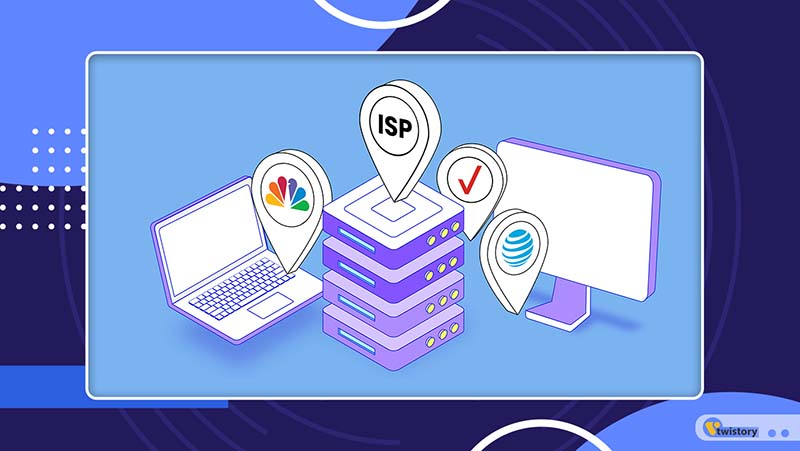
4.1 Benefits of ISP Proxies
- Reduced Detection Risk: ISP proxies, being provided by Internet Service Providers, often masquerade effectively as residential IPs. This is a big plus for tasks like web scraping and managing social media platforms, where flying under the radar is key.
- Superior Speed and Stability: Thanks to their hosting on data center servers, ISP proxies boast a beefier bandwidth connection compared to residential proxies. This translates to a smoother experience in high-speed data tasks, like streaming your favorite shows or live sports.
- Persistent Sessions: One of the hallmarks of ISP proxies is their static nature. They hold onto the same IP address for extended periods, making them a go-to choice for activities that need a stable, uninterrupted connection, such as downloading hefty files or consistent uploading.
4.2 Limitation of ISP Proxies
- Geographical Constraints: The reach of ISP proxy networks can vary, depending on your provider’s coverage. The availability and demand of ISP proxy servers can differ widely across regions, so it’s something to consider when you’re picking a proxy service.
5. Benefits and Limitations of Residential Proxies
Residential proxies offer several benefits, but they also come with limitations that should be considered.

5.1 Benefits Residential Proxies
- Enhanced Anonymity: Residential proxies leverage actual IP addresses from household internet connections, effectively cloaking the user’s original IP. This high level of legitimacy is especially beneficial for tasks like bypassing geo-restrictions and adeptly handling web scraping projects.
- Broad IP Range: When it comes to IP address variety, residential proxy networks often outpace ISP proxies. They boast a vast, geographically dispersed pool of IPs, significantly lowering the odds of repeating the same IP address. This means each of your requests to a target site can travel through a unique residential IP, enhancing the effectiveness of your activities.
5.2 Limitation Residential Proxies
- Connection Variability: As residential proxies use real-world devices to route your requests, they can sometimes be slower in data retrieval compared to their datacenter counterparts. This is due to the inherent variability in residential internet connections.
6. Use Cases for ISP Proxies and Residential Proxies
Choosing the ideal proxy is akin to picking the perfect tool for a specific job – it all hinges on what you need and the task you’re undertaking. Let’s find out what ISP vs residential proxies use in the following cases:
6.1 ISP Proxy Applications
- Social Media Management: For those juggling multiple social media accounts on platforms like Instagram or Facebook, ISP proxies are a solid choice. They give each account the appearance of being managed by a distinct, steady user, greatly diminishing the likelihood of tripping any security alarms on these platforms.
- Digital Advertising: In the world of online advertising, keeping track of ad performance is key. ISP proxies help maintain a consistent IP, allowing for uninterrupted data collection and accurate performance metrics.
- SEO Tasks: For SEO experts analyzing localized search results, having a stable IP address is a game changer. ISP proxies offer this consistency, ensuring that your SEO tracking and analysis are precise and reliable.
6.2 Residential Proxy Applications
- Web Scraping: When it comes to covertly gathering data, residential proxies are a treasure. Their ever-changing IPs make it hard for sites to detect and thwart your scraping efforts.
- Accessing Geo-Restricted Content: If there’s a show or content available only in a specific region, residential proxies come to the rescue by hiding your actual location. This lets you access global content as if you were a local.
- Online Shopping Sprees: During those frenzied flash sales or for snagging limited-edition items, residential proxies can help you circumvent website limitations, increasing your chances of landing those elusive deals.
7. Things to Keep in Mind When Using ISP Proxies and Residential Proxies
When using ISP proxies and residential proxies, we need to take into account a number of essential factors to ensure their responsible and effective use.
7.1 ISP Proxies:
- Detection Awareness: Be mindful that some sites can still sniff out and block ISP proxies, particularly those originating from data centers.
- Balancing Speed with Authenticity: ISP proxies typically offer faster connections but may not seem as “genuine” as residential proxies. Weigh this against the needs of your task.
- Legal and Ethical Usage: It’s paramount to use ISP proxies within the bounds of legality and ethics. Steer clear of unlawful activities or infringing on others’ privacy.
- Budget-Friendly: Generally, ISP proxies are more wallet-friendly than residential ones. This is crucial if you need proxies in bulk.
- Provider Dependability: Opt for a reputable proxy service provider to avoid low-quality connections or lackluster support.
- Usage Awareness: Keep an eye on any bandwidth or usage caps to prevent sudden service stops.
7.2 Residential Proxies:
- Enhanced Legitimacy: Thanks to their origin from real user IPs, residential proxies typically face fewer blocks, perfect for web scraping or managing social media profiles.
- Higher Costs: They usually come with a steeper price tag, so plan your finances accordingly.
- Inconsistent Speeds: Given they depend on actual residential internet speeds, expect some variability.
- Ethical Employment: Use residential proxies ethically, particularly since they involve real people’s IPs. Avoid any actions that could misuse these addresses.
- Legal Adherence: Make sure your residential proxy use aligns with data privacy and cybersecurity laws.
- Provider Integrity: Select a provider that’s transparent and trustworthy, as the sourcing of residential IPs can sometimes tread into grey areas.
8. Conclusion
In conclusion, this article on the topic of “ISP vs Residential Proxies” presents a fascinating exploration into the world of online anonymity and accessibility. Each type offers unique benefits and limitations, tailored to different online needs – from the speed and cost-effectiveness of ISP proxies to the authenticity and lower block-rate of residential proxies. Understanding these differences is key to choosing the right tool for your digital tasks. For more insightful discussions and expert advice on similar topics, don’t forget to explore more blogs from Twistory.

